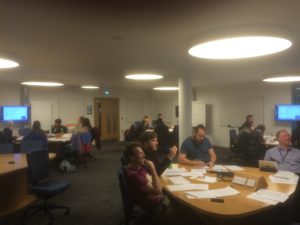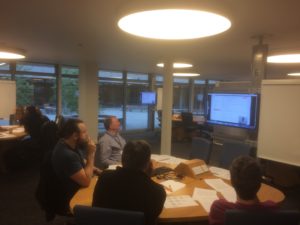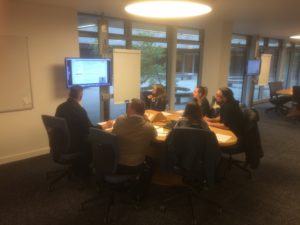Helping Helpline help our students – usability testing showcase session
In our latest showcase of the Usability Testing Service (held 15 June), we worked with our frontline IT support colleagues to learn where their website self help pages could be better.
I worked with Gav Anderson (responsible for their web pages) and Neil Bruce (Service Manager) to identify a focus for testing that would provide them with actionable insight and set a pattern for an ongoing improvement process.
We looked at the thousands of support calls from current students that Helpline deal with, and focused in on areas where Gav felt the students should have been able to help themselves.
He provided sample questions that represented thousands of support calls that the team deal with every year, and the corresponding pages he manages that are there to empower students to solve the problems for themselves.
We tested with three students who all happened to be pretty technical. People who had the skills and inclination to solve their own IT problems. But still we saw numerous usability issues and got insight into why so many students submit emails requesting support.
Then we ran our usual showcase workshop attended by Helpline team members, and twenty-something interested colleagues from across the institution.
You can learn more about the specifics of the workshop process from my previous blog post.
Making usability agile – my previous blog post outlining the process
Next showcase session 30 June
Next session 30 June – book a space to contribute to Degree Finder usability (Edinburgh staff only)
What Helpline got out of the session
The session gave our Helpline colleagues insight into their target audience’s behaviour online, and also got the input of a range of colleagues who could also share their opinions, observations and experiences.
We saw things that Gav could deal with right away; rewording and restructuring pages for better readability and performance in search engines. (And our weekly Support Clinics are stepping up to help here).
We also saw things that needed addressing in the longer term; fixing web pages outside of Helpline’s direct influence and underlying processes that just aren’t sufficiently user centred.
In total we collaboratively logged and prioritised 10 usability issues:
- 3 critical
- 4 serious
- 1 medium
- 2 low
The session gives Neil the ammunition to take to colleagues elsewhere, and with our support, agitate for change.
I think the most stark element of this session was seeing how content management and IA decisions made across the University by business units within and beyond Information Services are costing Helpline. We haven’t done the sums yet, but the figure arising from he cost of dealing with unnecessary user support calls will be in the tens of thousands of pounds, at least.
What Helpline colleagues said
Neil Bruce is working with us to explore ways in which ongoing usability testing can help improve the student experience around access to IT services.
I found it very enlightening to watch people using our website, this brings home the user experience very clearly. It certainly gets you thinking when you see both the things that work well with your website, and the things that cause problems. It’s highlighted a range of areas where we can make improvement, from some quick and easy fixes to areas that need more careful consideration. I can see this methodology becoming an important tool in the design and development of our web presence in the future.
Neil Bruce (Head of Operational Services)
Gav Anderson is responsible for delivery of front-line services to students. He maintains web pages on behalf of the team, and monitors support call analytics.
I found the usability sessions to be extremely helpful and instructive in identifying areas of the University website, and the Information Services website in particular, that were having issues in directing users successfully to their desired goals. It flagged up user behaviours that we had not taken into account, gave several excellent methodologies one can employ when looking to improve the flow of information on a website, and helped in pointing out very useful ways in which any changes made can be quantified and further developed to provide regular improvements to the sites in question.
Gav Anderson
Next session – Degree Finder experience – 30 June
Our next showcase workshop is on Thursday 30 June. We’re working with Communications and Marketing to explore student experiences with this business critical area of the University’s web estate.
It’s free and open to all University staff.
Book a place- EASE login required
What attendees thought of the session
If you attended this session, please leave a comment and let readers know how you found it.





Well worth attending if you want to learn more about how user testings works. Not enough to get you up and running on your own – that would require way more than two hours – but enough to let you see the value and understand the process.
Thanks Rob.
I’d agree that running and recording your own usability tests requires a bit more than is covered in this session. But not that much more – I run training in this from time to time (3 hours) and the book I recommended (Rocket Surgery Made Easy) does an excellent job of taking you through it. And of course there are remote testing tools that do the recruitment and recording for you…
I hope though that having sat through the workshop format, together with the resources and tips, colleagues feel able to try this for themselves. Maybe not running for their senior managers at first, but for their peers.
It’s all about practice and self awareness, and through this comes confidence.
If this is something you’d like to pursue but feel a little more help is needed, get in touch via our website and one of the team can support you 1-2-1 though our weekly Clinic sessions.
A very useful session giving you insight into how usability testing works and how helpful it is. I would definitely recommend it to all colleagues looking to make improvements to their websites.
Gave me some good ideas about how to find then target key areas of my site using user-testing techniques.
It was very useful to see the benefits of user testing with a variety of testers with varying backgrounds. Processes that are easily understood by IT staff can often be a repetitive stumbling block for non IT users. These techniques help understand how process are viewed from varying backgrounds. Good stuff.
Informative session – particularly the objective-based approach to how to prioritise changes.
I now feel confident running my own session.
Workshop was very clear and interesting. It made me realise we should bring in UX work as early as possible in our project’s development and I am now taking steps to make this happen.
The workshop was well run and very interesting. It was good to see the student interaction on the scenarios and how it can be used to make improvements to the website content. This could certainly be a benefit to us in the Income Section if we choose to go down this route.
Received via email:
“I think it is really useful to actually see real users try to do tasks in real life, and also helpful to be given a method to help analyse it.
I think there is demand for events like these – if I was going to be critical one thing I would say is that the event was a few hours long and some of them are advertised with relatively short notice. For our team we often need things to already be in the diary, or we are so busy we can’t come.
I think it would be useful for some of my colleagues to attend something like this.”